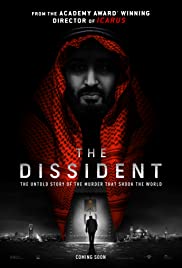
THE DISSIDENT
US, 2020, 119 minutes, Colour.
Directed by Bryan Fogel.
One of the strong features of recent years is the development of the documentary as a means of investigative journalism. While television is the main outlet for these investigations, filmmakers have become more ambitious, taking up controversial issues, having big budgets for research, interviews, collecting film footage, having almost 2 hours at their disposal to make their impact and challenge an audience.
Collective, the Romanian expose of corruption in health administration in Bucharest, was a recent Academy award nominee. And this film is worth a nomination.
In 2018, the story behind this film made world headlines, a focus on the Saudi Arabian journalist, Jamal Khashoggi, who went into the Saudi Arabian Consulate in Istanbul for documentation in preparation for his marriage to a Turkish citizen. He never came out.
The world reporting of this event led to a confusion of headlines, additions to the story, denials, admissions, mysteries concerning the number of men from Saudi Arabia at the consulate, admission of the death but variations on what happened.
American researcher, director, Bryan Fogel, has a great deal of film footage from the period to incorporate into his reconstruction of the events. He also has the advantage, a sad advantage, of being able to have Khashoggi’s fiance, Hatice Cengiz, participating in the project. This certainly personalises the story along with footage of Khashoggi making speeches, photographed in various situations, highlighting the injustice of his murder.
The documentary also has the advantage of incorporating the presence of a Saudi exile, living in Canada, Omar Abdulaziz. He is interviewed and his presence in the film, the way he is photographed, edited into the narrative, seems more like a character from a spy thriller. In fact, he made friends with Khashoggi, especially when the journalist became the target of an extraordinary campaign on social media, on Twitter, intrusive hacking, a set up by the Saudi government – and, the continued implications of the Crown Prince as the instigator of the murder.
While the audience is absorbing this information, there is a striking animation sequence inserted, noting that the intrusive Twitter attack is likened to Flies – and, they are visualised, along with a collage of hundreds of Arab men sitting at their computers. And, it is explained, the counter-attack is named as Bees, again animation illustration of this counter-attack.
Amongst the many talking heads for the documentary are Turkish authorities, the police, politicians, giving interesting accounts of how they handled the situation. There are also quite a number of interventions by International authorities.
The challenge to the audience is to look at how the Saudi Arabian authorities handled the fact of the murder, the accusations, arresting and trying several of the participants in the courts. But, the film also suggests that countries around the world have been very hesitant in terms of condemnations, sanctions, links with the Crown Prince and the Saudi government.
The Dissident plays as a drama as well as an investigative exploration of the events in Istanbul, the motivations behind them, and the consequences – and lack of consequences.
- Acclaimed documentary? Limited distribution – the influence of Saudi Arabia and pressures?
- The title, the focus on Jamal Khashoggi, the story of his murder, of cover-ups, explanations, falsehoods? Eventual trial? This film as investigative journalism?
- Audience knowledge of the facts, Jamal Khashoggi, Saudi background, his commentary and critique, having to leave Saudi Arabia, divorce his wife, leave his children, go to the United States, work of the Washington Post, his articles, travel, the meeting with Hatice Cengiz, engagement, documents, the visit to the Saudi consulate in Istanbul? Long time inside, not coming out, suspicions, the Turkish authorities…?
- The style of the documentary, supplying of the background information? The reliance on film footage of the time, reconstructions of situations? The range of interviews? With the Turkish authorities, prosecutors? With international legal authorities?
- The significance of the interviews with Hatice Cengiz? Her presence throughout the film? The waiting outside the consulate, the repercussions, her grief, meetings, speeches?
- The introduction of the character of Omar Abdulaziz? Worked into the documentary -like a character in a feature film? His screen presence, his background, in Canada, the contact with Khashoggi The revelation about computer hacking, trolling, the revelations to Khashoggi, the counterbalance in online attacks, Twitter…?
- The effect of the animation to illustrate the online attacks, the significance of the Flies, the Bees, the visualising of the insects? The visualising of the multitude of hackers and tweeters?
- The progression of the case, the various theories given, the misinformation, the gradual emergence of what happened, Saudi admissions, the information about the 15 personnel in the consulate, the return to Saudi Arabia, the trials, the guilty verdicts, those acquitted?
- In the background, the Crown Prince, his reputation, wanting to change Saudi Arabia, his power, influences and advisers, his responsibility for the murder? The lack of condemnation internationally, no sanctions?
- The subsequent history of the case, in the courts, the first anniversary, the various meetings and protests?
- The contribution of this kind of documentary to world events, exposes, critique, contribution to finding the truth?